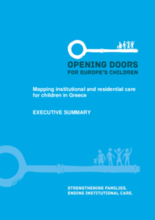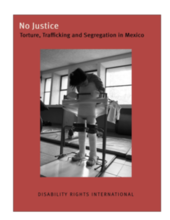Displaying 411 - 420 of 713
To better understand the situation of children in institutional care in Greece, Roots Research Centre, the national coordinator of Opening Doors for Europe's Children, conducted the first nation-wide mapping of institutional and residential care in Greece. The study revealed "a patchwork" of public and private institutions and residential care facilities with little or no oversight of quality and no monitoring of the numbers of children and what happens to them.
This video gives an inside look at an assisted family setting in Ghana where children with disabilities live with their foster mothers. It highlights the increased risk of family separation faced by children with special needs and advocates for the provision of quality family-based care to children who cannot be with their parents or extended families.
This video is presented by Better Care Network and UNICEF. It tells the story of Maureen, a young girl in Kenya who was separated from her family and sent to live in a children's home. It also features interviews with experts, including those who have lived in children's homes, explaining some of the negative impacts of institutionalization and highlights the efforts of Care Reform Initiatives to deinstitutionalize children in Kenya and Ghana.
This video is presented by Better Care Network and UNICEF. It tells the story of Maureen, a young girl in Kenya who was separated from her family and sent to live in a children's home. The video also features interviews with experts, including those who have lived in children's homes, explaining some of the negative impacts of institutionalization and highlights the efforts of care reform initiatives to deinstitutionalize children in Kenya.
This animated video from Lumos, narrated by Lumos founder J.K. Rowling, illustrates the “tragic consequences of orphanage care,” and argues that more can and should be done to support families to care for their children, eliminating the use of institutional care.
Visionaries, a documentary series on public television in the United States, aired two episodes featuring the work of Disability Rights International (DRI) in uncovering the egregious abuses suffered by children and adults with disabilities living in institutions around the world.
In August 2015, Child Family Health International (CFHI) held a webinar reviewing the situation of children living in residential care facilities around the world.
This interpretive study examines the experiences of 54 Ethiopian emerging adults who had aged out of institutional care facilities.
This report from Disability Rights International (DRI) outlines the findings from a two-year investigation into the treatment of children and adults with mental disabilities in Mexico City, particularly those in the care of state-funded and private residential facilities.
This study investigates the correlation over time between international adoption and institutional care.


